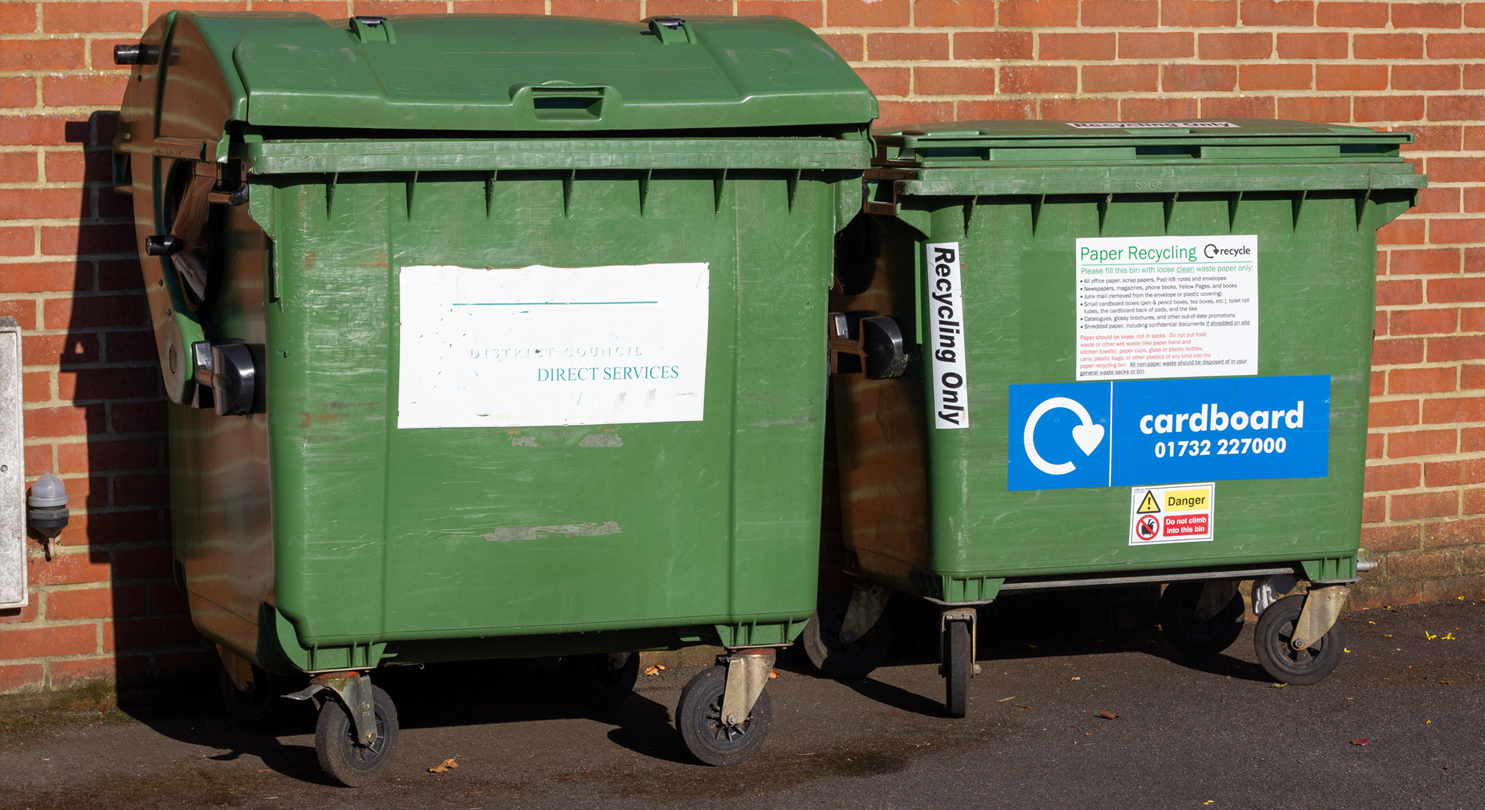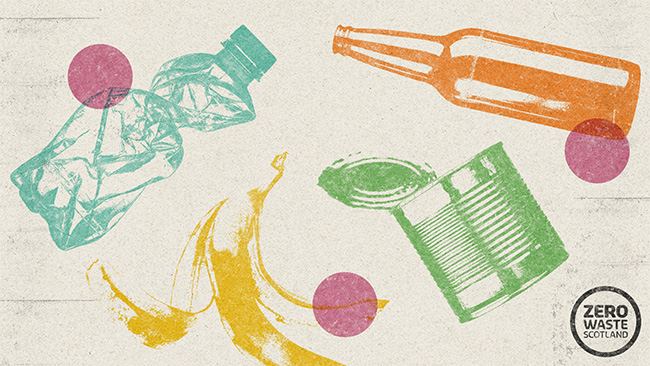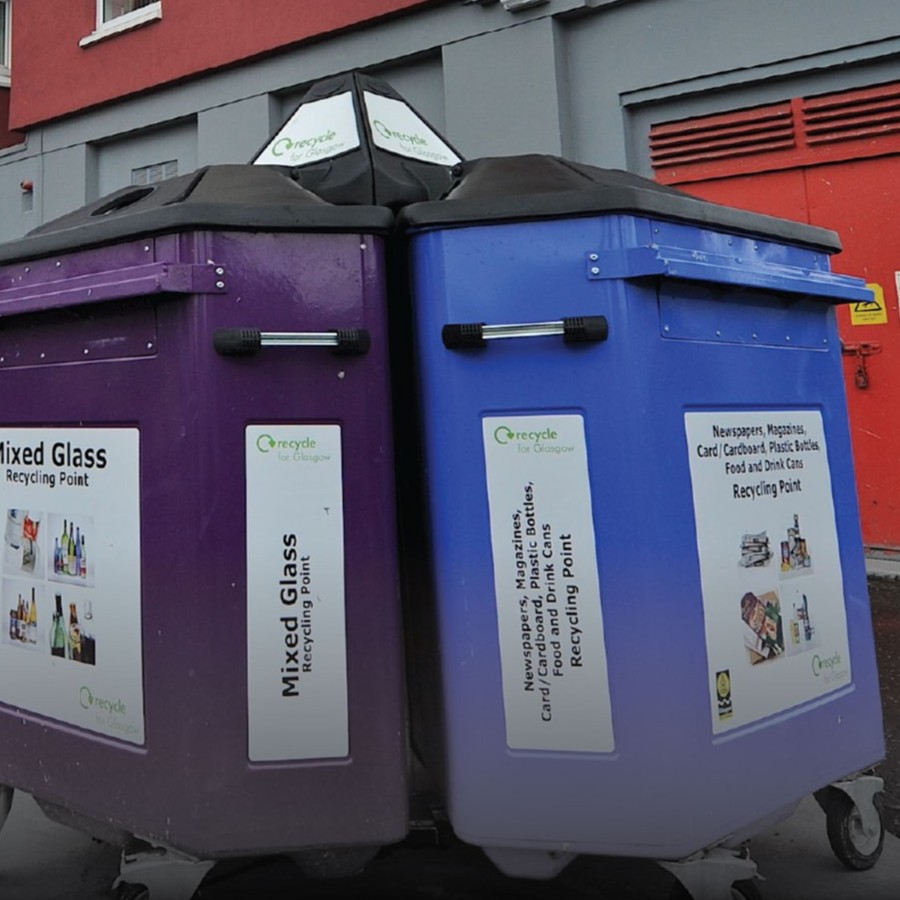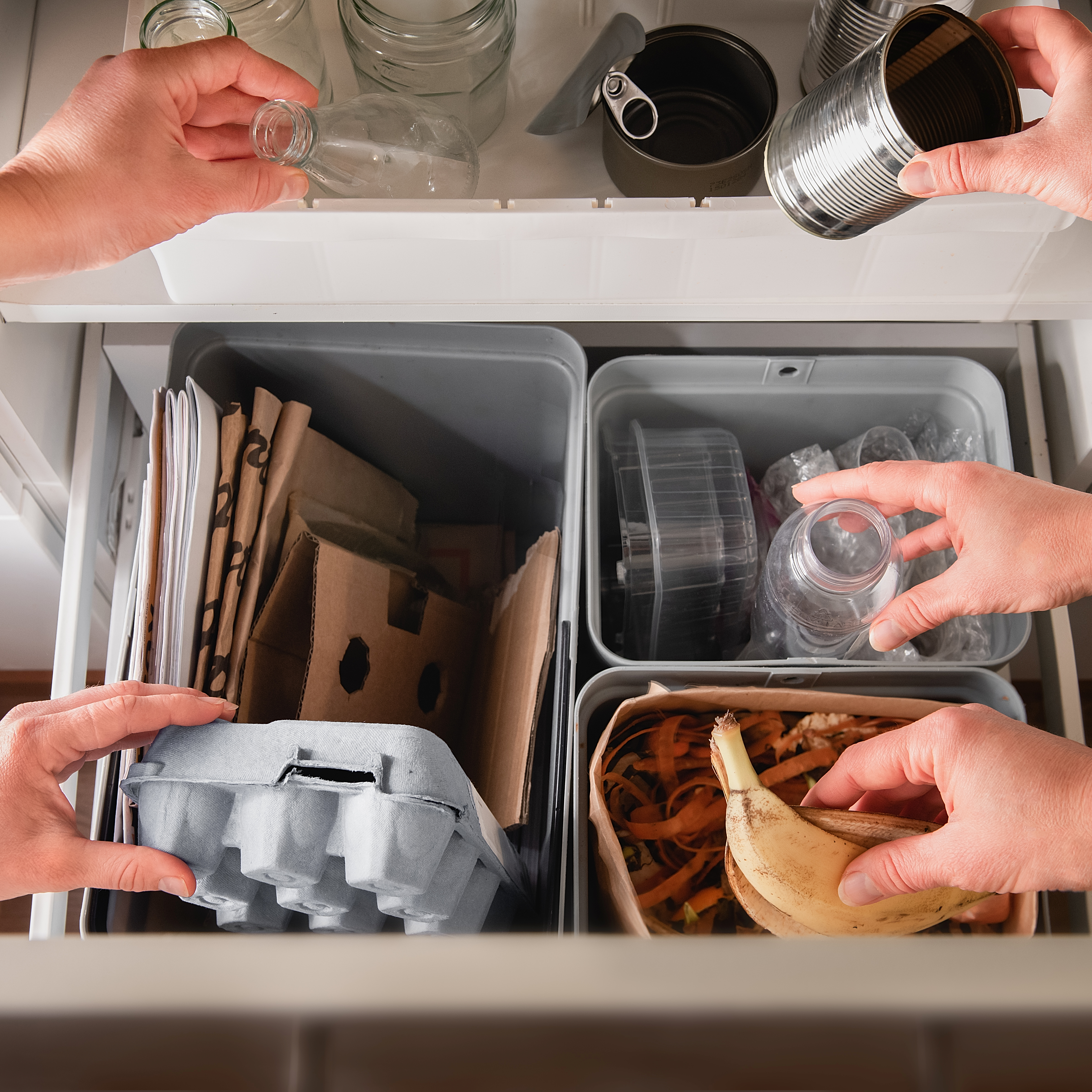
Waste (Scotland) Regulations
Scotland’s waste regulations have changed for all organisations, whether private public or voluntary. Since 1 January 2014, the Waste (Scotland) Regulations have been in force.
All organisations operating in Scotland, big and small, should be recycling their plastic, metal, glass, paper and card or risk a fine. Most food businesses will also have to recycle their food waste.
What do the regulations require?
The Waste (Scotland) Regulations require that any and all organisations in Scotland present the following materials for recycling:
- Glass (including drinks bottles & rinsed empty food jars);
- Metal (including cans, tins);
- Plastic (including, drinks bottles & rinsed empty food containers);
- Paper;
- Cardboard;
- Most urban food businesses will need to present food waste separately for collection
Food businesses
Urban food businesses (such as cafés, restaurants or food takeaways) which produce over 5 kg of food waste per week also have to present food waste separately for collection unless excluded by a rural location.
A food business is defined as “An undertaking, whether for profit or not, and whether public or private, carrying out any activity related to the processing, distribution, preparation or sale of food”. This excludes businesses which only prepare and sell drinks.
When a premises is used to consume food brought from elsewhere e.g. an office where staff bring in food for personal consumption, are not regarded as food businesses. However, a staff canteen where food is prepared, sold and consumed is classed as a food business. The following type of organisations are likely to be affected by the Regulations; hotels, restaurants, cafés, shopping centre food courts, canteens, public houses or shops that serve food, supermarkets, schools and colleges with canteens, prisons, nursing homes and hospitals.
Use the Scottish Government Urban Rural Classification Postcode Lookup to see whether your business area is considered to be rural or non-rural.
Key details:
- Disposing of food waste into public drains or sewers is illegal.
- Where collections are available, it will be illegal to dispose of food waste into a public drain or sewer
- Any urban / non-rural business or organisation which produces food waste will have a duty to ensure that it is not deposited directly or indirectly into a public drain or sewer.
- Food waste disposers such as macerators cannot be used to discharge food waste to a drain or sewer in a non-rural area where a separate food waste collection service is available.
- Systems which dewater food waste at source and store the solid material for collection and treatment are an acceptable form of management, but only if the loss of solid matter to sewers is minimal. Systems like enzymatic digesters which do not recover any organic waste prior to it going to sewer are banned under the Regulations as the food waste is all going into the sewer.
- There is no legal requirement for macerators to be removed however your organisation may choose to remove macerators to prevent staff using them and avoid the risk of a fine. Businesses are also liable to prosecution under Section 46 of the Sewerage (Scotland) Act 1968 which makes it an offence to discharge any substance into the public sewer likely to obstruct its free flow. Disposing of food waste to the drain could also result in flooding within your (and surrounding) business premises.
- There is evidence to suggest that fat, oils and grease cause the majority of drain blockages and further legislation is underway to deal with this specific problem.
How to be compliant in 5 steps
Speak with your local authority or waste contractor
They should be able to offer advice and a service that enables you to comply with your Duty of Care. Putting all your waste in a single bin is not compliant if any recyclables are present - any contractor that offers such a service should be reported to SEPA
Train your staff and add label bins
Label bins stating clearly what should be recycled and ensure staff know what goes where
Think before you throw
Do not contaminate recyclables or food waste.
Your waste contractor may refuse to uplift recyclables or food waste (or charge extra) if they are contaminated by other materials.
Use clear bags to collect recyclables, black bin bags should only be used for general waste.
If you are a food business, you will probably need to present food waste for collection
Use the Scottish Government Urban Rural Classification Postcode Lookup which will help you check if your organisation’s location is urban or rural. If rural you may be exempt from the requirement to segregate food waste.
Try to reduce waste
Look at what you are paying to have waste collected and think about how to reduce the amount of waste you produce. Preventing waste from occurring is always preferable to managing it.
Why be compliant?
It’s better for your business, the environment and the economy
Increasing recycling rates has the potential to bring about significant benefits to Scotland’s economy and environment. For example; supporting and expanding Scotland’s recycling industry will help reduce our demand for expensive virgin materials while also creating new opportunities for economic growth and jobs in the recycling sector. By reducing our reliance on landfill by increasing recycling will substantially reduce landfill emissions of methane, a greenhouse gas 24 times more potent than carbon dioxide. And by processing food waste at anaerobic digestion facilitates we are able to harness green energy and produce high quality fertilisers.
For food businesses the recipe for success resides in purchasing and production efficiencies that mitigate waste as there is a direct correlation between waste and the profitability. Recycling food waste is good, but preventing food waste is even better. Food waste harms the environment by wasting the energy, fuel and water that went into producing it. When disposed of to landfill it produces methane, a damaging greenhouse gas. Composting or recovery of biodegradable waste (such as food or garden waste) could help you save money on your waste disposal costs and reduce environmental impact as food is heavy and you pay per uplift. Composting can be considered as recycling if it meets the standard of a quality protocol (such as PAS 100).
Organisational Duty of Care
Every organisation and business has a Duty of Care (a legal responsibility) for waste they generate.
This means, you must:
- Store your waste securely so it does not cause litter or attract vermin;
- Ensure your waste is transferred to an authorised collector such as your local authority or a reputable waste contractor;
- Complete a waste transfer note for any transfer of waste and retain a copy of this note for two years;
- If carrying your own waste to recycling facilities you should be appropriately registered with the Scottish Environment Protection Agency (SEPA). This registration is free and the simple application form is available on the SEPA website.
Duty of Care expands to include the Waste (Scotland) Regulations and non-compliance could risk a potential fine of up to £10,000, with SEPA able to issue fixed penalty notices.
Frequently Asked Questions
Do the Waste (Scotland) Regulations apply to me?
Yes - all business and organisations in Scotland must present the following materials for recycling (if generated):
- Glass (including drinks bottles and rinsed food jars)
- Metal (including rinsed cans and tins)
- Plastic (including drinks bottles and rinsed food containers)
- Paper
- Cardboard
- Food businesses (such as cafés, restaurants & other premises preparing or selling food) which produce over 50kg of food waste per week (dropping to 5 kg food waste per week from 1 January 2016) also have to present food waste separately for collection unless excluded by a rural location. Check using the rural postcode finder
Your waste management contractor will be able to provide advice on how to present material for collection and avoid contamination.
What will happen if I don't comply with the Waste Regulations?
Persistent non-compliance will be addressed through local authority or SEPA duty of care enforcement procedures (dependent upon the regulating authority). Any person who fails without reasonable excuse to comply with the duties imposed above shall be liable:
(a) on summary conviction, to a fine not exceeding the statutory maximum (£10,000); and
(b) on conviction on indictment, to an unlimited fine.
Can I work with other businesses to comply with the Waste (Scotland) Regulations?
Yes, sharing waste services maybe cost effective and reduce storage space requirements. However, appropriate arrangements are required to ensure the secure storage, authorised transfer and further management of the material from shared facilities to comply with Duty of Care responsibilities. These may be developed in a bespoke manner to suit individual circumstances.
My landlord takes care of my waste arrangements. Do I have any responsibility?
Yes. You are a waste producer and will need to meet the regulations. Your landlord should advise you about how to present your waste for collection if you rent a serviced office or a property run by a commercial property manager.
How can I be certain that my waste will be recycled?
Since 1 January 2014, waste managers are prohibited by law, from mixing your separately collected recyclable waste with other wastes and from sending it to incineration or landfill. This ensures that the effort you put into separating your waste will not be wasted.
If you hand waste to a carrier, and you suspect that your separately collected recyclables are being fly-tipped or are going to an incinerator or landfill, it is your responsibility to inform SEPA through their 24 hour pollution hotline – 0800 80 70 60. You can also use Crimestoppers’ anonymous online report form.
What paperwork do I need for managing my waste?
You will need a waste transfer note that will describe your waste and accompany it when it is passed on to your waste contractor. This is your evidence that the waste was passed on and that it was adequately described.
WTNs ensure that there is a clear audit trail from when the waste is produced until it is disposed of. You must keep copies of all your WTNs for at least two years.
A ‘season ticket’ system can be used for waste of the same description (same materials) transferred from the same waste producer to the same transferee for a period up to 12 months. This prevents the need for a transfer note to be produced for every waste load transferred.
A waste transfer note typically consists of four parts:
A description of the waste and the quantity that is to be collected
Your details (name, address etc.)
The details of the person you are handing your waste to. You will need to include name, address and any registration numbers applicable (e.g. waste carrier’s registration number).
Details of the transfer (place, date, time)." And the EWC codes/descriptions for several common materials.
What is the role of our facilities management (FM) company with regard to waste management?
The FM company may organise waste management services for the whole property. Arrangements should be reviewed periodically. Adequate arrangements are required for storage, authorised transfer and management of materials to comply with Duty of Care responsibilities.
How should I store my business waste?
You should store your waste in a safe and secure place, so that waste materials will not cause litter or attract vermin.
If my waste is managed by a contractor, who is responsible for ensuring that appropriate action is taken to comply with the Regulations?
Both the producer of the waste and the waste contractor have responsibilities. Using a waste contractor does not remove any of the responsibilities. It will be your responsibility to work with the contractor to ensure that both your requirements are being met.
My business is based outside Scotland but has premises in Scotland. Am I affected by the Waste (Scotland) Regulations?
Your business premises in Scotland will all fall under the Regulations.
Do the Waste (Scotland) Regulations apply offshore?
The requirement to recycle duty from the Waste (Scotland) Regulation 2012 does not apply to offshore facilities or vessels but does apply when the waste is brought onshore.
In practice, this means that once the material is brought to the mainland the waste manager has a duty to manage it in a way that promotes high quality recycling (dependent, of course, upon the materials’ state of segregation).
SEPA advise that it is good practice to configure waste systems that are landed into Scottish Ports in a way that allows high quality recycling.
How can I ensure that my employees all comply with the new Waste (Scotland) Regulations?
Train your staff and make sure they know how to recycle in the workplace. Label bins stating clearly what should be recycled and ensure staff know what goes where. Use the free online poster creator tool to help staff to recycle effectively.
What happens if I have concerns about what is happening to my organisation’s waste once my waste collector/contractor has picked it up?
If you suspect that your waste is being handled illegally by your waste contractor, it is your responsibility to inform SEPA via zerowaste@sepa.org.uk or through their 24 hour pollution hotline – 0800 80 70 60. You can also use Crimestoppers’ anonymous online report form






